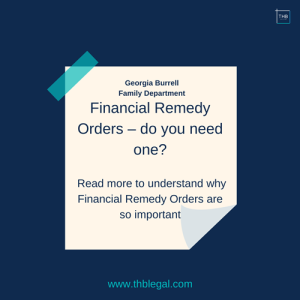Diversity Data for 2025
In accordance with SRA regulations we collect Diversity information, every two years, which is...- 04 July 2025
Posted: 27 October 2022
With divorce applications now being completed online, the quick and easy process has led some to forget about a crucial aspect of separation.
A Financial Remedy Order sets out how the finances within the marriage will be dealt with upon divorce. It may be as simple as both parties leaving the marriage how they came or it may be complex with pensions being shared and lump sums being paid. It depends entirely on your circumstances and what assets are within the marriage.

When divorcing, you may both already agree how the finances will be divided and come to an arrangement yourselves. However, this agreement will not be legally binding. In addition, not all marriages come to an amicable end so it is the Court’s role to decide if the agreement which has been reached is fair. Once an Order has been approved by the Court, neither party can make a financial claim against the other. The parties can then move on with their lives safe in the knowledge their finances are settled. It is important to remember that if you do not bring closure to your finances, they remain essentially ‘live’ and even in 15 years’ time, your spouse could still make a claim against your finances.
Discussions about finances can take place at any time in the divorce but you will need to have issued your divorce application before submitting any agreement to the Court. It is always positive if matters can be agreed amicably and the Court encourage this. Once an agreement is reached, your solicitor will draft an Order ready to submit to the Court. You also need to complete a D81 form which details your financial situation and any further information about the agreement. This form helps the Court decide if an agreement is fair and how a decision was reached. If the Court are happy with the agreement, they will approve and seal the Order making it final and legally binding.
There are two types of Financial Remedy Order. A Consent Order, which is made by agreement, or a Financial Remedy Order made by a Judge in financial proceedings. If you cannot reach an agreement or perhaps matters aren’t quite amicable, it may be necessary to issue financial proceedings.
Our divorce and separation solicitors can guide you through the financial remedy process as well as providing advice in respect of divorces. Legal aid is available to those eligible for divorce and financial matters but we also assist those paying privately. Call our team on 01245 493 959 or contact us at [email protected] to speak with us further.
- 04 July 2025
- 30 June 2025
- 12 June 2025